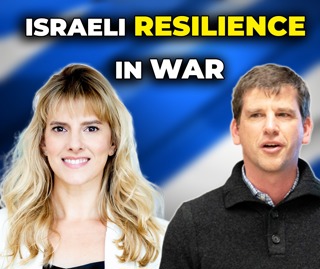
20VC: Israeli Resilience From Tech and Beyond with Michael Eisenberg and Adi Levanon
Michael Eisenberg spent 15 years as a General Partner @ Benchmark working alongside Bill and the Benchmark partnership. Following Benchmark, Michael co-founded Aleph, one of the leading Israeli venture funds of the last decade with a portfolio including Lemonade, Melio and HoneyBook, just to name a couple of Aleph's unicorns. Adi Levanon is the Founder & Managing Partner @ Selah Ventures, a solo-GP-founded venture fund investing $500k checks into AI-based solutions that enhance financial services, healthcare organizations, fintechs, and SMBs, with a focus on founders in the US and Israelis globally. In Today's Episode on Israeli Resilience We Discuss: Where are we at today? What is it like on the ground, today? Have the international community reacted as expected? What more can be done? What does it mean to be called up for "reserve"? How are companies dealing with 25% of their teams being called into the armed forces? Are VCs investing still? Does work carry on? Whose reactions are exemplary and we should look to follow? Whose have been woeful and should be called out? What are the single biggest misconceptions of the situation? What can people do to help? What can be done?
12 Loka 202344min
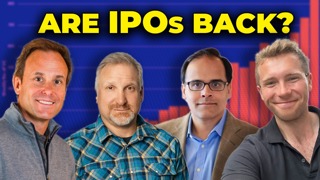
20VC Roundtable: Are IPOs Back? Is Growth Dead? What Does it Take to Raise a Growth Round Today? How Do VCs Solve The Liquidity Challenge? Will We See a Massive Resetting of Valuations? AI Hype Growth Rounds?
Deven Parekh is a Managing Director at Insight Partners, one of the leading investing franchises of the last 25 years. Deven has made more than 90 investments since joining in 2000 including in the likes of Twitter, Alibaba, JD.com, Chargebee and Automattic (WordPress) to name a few. Woody Marshall is a General Partner @ TCV, one of the most successful growth funds of the last decade with a portfolio including the likes of Facebook, AirBnB, Spotify, LinkedIn and many more incredible companies. Jason Lemkin is the Founder @ SaaStr one of the best-performing early-stage venture funds focused on SaaS. In the past, Jason has led investments in Algolia, Pipedrive, Salesloft, TalkDesk, and RevenueCat to name a few. In Today's Episode We Discuss: 1. The Growth Landscape Overview: Is growth dead? Are any growth deals getting done? How has the price changed for growth deals that are getting done? Which type of growth companies will vs will not be able to raise? What happens to all of the growth companies with $300-$500M in cash but little revenue? 2. The Great Reset: Valuations Need to Change: Why should companies be actively resetting their valuations? What are the benefits? What will happen between VCs and LPs when there is no incentive for VCs to reset their portfolio valuations when they need to go out and raise from those same LPs? Structure is often part of these valuation resets, is structure to rounds always bad? When is it good? What type of structure is acceptable vs unacceptable? 3. Are the Public Markets Creeping Open: Should we take comfort from ARM, Instacart and Klaviyo and assume the public markets are going to open again? If not, what will cause them to open? How should we analyze the performance of the IPOs above? Many have been negative, are they right to suggest this is not the response we wanted? Why does Woody believe, like Instacart taking a 75% discount to their last round, we should have more and more companies go public at discounts to their last private round? 4. Late Stage Growth is Dead and Revenue Multiples: Why is late-stage growth dead? How long do we think this will last? How should we assess revenue multiples today? New normal? Same as always? How will revenue multiples look in 12 months from now? How should we analyse the large late stage growth rounds for hyped AI companies? What happens there?
11 Loka 202350min
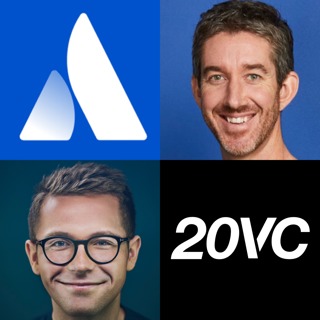
20VC: Atlassian Co-Founder Scott Farquhar on The Biggest Lessons Scaling Atlassian to $50BN Market Cap; The Four Roles of the CEO, The Funding Round That Net Accel $6BN, The Regrets of Omission and Commission & The Honeymoon Cut Short
Scott Farquhar is the Co-Founder & Co-CEO @ Atlassian. Scott co-founded the company with his university friend, Mike Cannon-Brookes, in 2002 from Australia. Over an incredible 20-year journey they have grown to a market cap of $50BN today, over 11,000 staff globally and serving over 260,000 customers. Scott is also a co-founder of Skip Capital, a private investment fund with a portfolio including Figma, Snyk, Canva and more. In Today's Episode with Scott Farquhar We Discuss: 1. The 20-Year Journey to $50BN Market Cap: How did Scott first make his way into the world of tech and come to co-found Atlassian? What does Scott know now that he wishes he had known at the beginning? From 20 years with Mike, what is Scott's biggest advice on choosing your co-founder? 2. The Fundraising Masterclass with Atlassian: An emergency phone call, a honeymoon cut short; how did the first funding round for Atlassian come to be? Where was the business revenue-wise at the time? Why did Scott not like the traditional fundraising process? What did he do to add game theory and ensure that they got the best deal as a company? Why did Scott choose Accel with their offer? How did Peter Fenton lose a $3BN deal with Atlassian? 3. Lessons Scaling Atlassian to $4BN in Revenue: What does Scott believe are the 4 core roles of the CEO? Is resource allocation the most important? What are the single biggest acts of commission and omission that Scott regrets? What are the biggest lessons Scott has from shutting down Stride, their Slack competitor? 4. Scott: The Father, Husband and Philanthropist: What does great fatherhood mean to Scott today? What is the secret to a truly successful marriage? How does Scott assess his relationship to money today? How has it changed with time? How does Scott think about bringing children up in a world of affluence and abundance? Fun Fact: Every single 20VC episode is recorded with Riverside.FM. It is the one product that I could not live without. Try it today here (https://creators.riverside.fm/20VC) and use the code 20VC for 15% off.
9 Loka 202353min
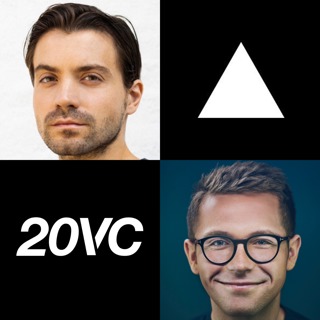
20VC: Why Great Companies are Defined by How Many Things They Say No To, Why Being First Does Not Matter & Why Market Over Traction or Team is the Most Important Thing with Guillermo Rauch, Founder & CEO @ Vercel
Guillermo Rauch is the Founder and CEO @ Vercel, giving developers the frameworks, workflows, and infrastructure to build a faster, more personalized Web. To date, Guillermo has raised $312M from Accel, Bedrock, Greenoaks, GV and more. Prior to founding Vercel, Guillermo co-founded LearnBoost and Cloudup where he served the company as CTO through its acquisition by Automattic in 2013. In Today's Episode with Guillermo Rauch We Discuss: 1. From Argentina to SF: The Boy Making Money Online: How did Guillermo first get into computers and start making money online? Does Guillermo still believe the US and SF offers the same opportunities it did when he came? Did Guillermo feel the weight of responsibility of providing for his family at a young age? 2. Timing, Markets and Narrative Violations: Why does Guillermo believe it does not matter being first but being right? Why does Guillermo believe the most important thing for a company is market selection? Why does Guillermo believe it is crucial that founders and companies have "narrative violations"? 3. The Future of AI: What model will win in the future; open or closed? Where does the value accrue; startups or incumbents? How will the SaaS business model change in a world of AI? 4. Silicon Valley's Most Successful Angel You Did Not Know: What are some of Guillermo's biggest lessons from angel investing? What is his single biggest miss? How has it changed how he thinks? What have been his biggest hits? How did they impact how he thinks about what it takes to win?
6 Loka 202358min
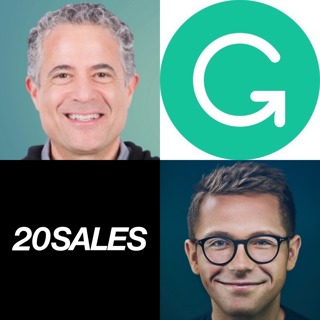
20Sales: Why the Founder Should Not Be the One to Create the Sales Playbook, Why You Should Hire a Sales Leader Before Sales Reps & Why You Should Not Hire Sales Leaders From Big Companies with Matt Rosenberg, CRO @ Grammarly
Matt Rosenberg is Grammarly's Chief Revenue Officer and Head of Grammarly Business. He leads all B2B revenue, operations, and growth for Grammarly Business, Grammarly for Education, and Grammarly for Developers. Previously, as CRO of Compass, he took the company into the Fortune 500 and contributed to a more than eightfold increase in business growth. Prior to Compass, Matt served as Eventbrite's CRO leading them to become the largest event platform in the world by event count. In Today's Episode with Matt Rosenberg We Discuss: 1. From Miserable Lawyer to World Beating Sales Leader: How did Matt make the transition from lawyer to sales leader? What does Matt know now that he wishes he had known when he started in sales? What are Matt's biggest pieces of advice for anyone who wants to make a career change and is lacking confidence? 2. The Playbook and Hiring The Team: How does Matt define the "sales playbook"? Should the founder be the one to create and execute V1 of the playbook? Should the first sales hire be a rep or a sales leader? When is the right time to make that all-important first sales hire? 3. Discounting, Champions and Urgency: What can sales team do to create urgency in deal cycles? What works? What does not? How does Matt approach discounting? When to do it vs when not to? What level is acceptable? What are the biggest secrets to creating champions within prospects? Why does Matt believe that deals are won and lost in prospecting? 4. Developing Great Sales Talent: How does Matt use sales call recordings to train teams? What is his 3x3 matrix for coaching calls? What is a good reason to lose a deal vs a bad reason? How does Matt do deal reviews? What are the single biggest elements sales leaders can do to nurture sales talent? What are the biggest mistakes sales leaders make when developing talent internally?
4 Loka 202350min
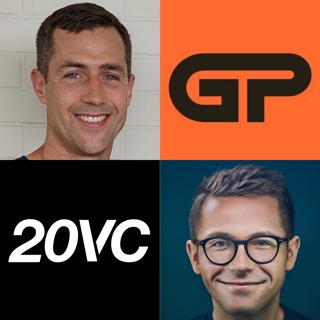
20VC: The Services Model of Venture Capital is Broken, The Best Founders Do Need Help, The Most Important Signals to Assess When Meeting Founders & Why Kids Bring Less Happiness and More Joy with Phin Barnes @ TheGP
Phin Barnes is the Co-founder and Managing Partner of The General Partnership (TheGP), a venture capital firm that's redefining what partnership means for founders. Previously, Phin spent over a decade at First Round Capital, where he was responsible for over 60 investments including Blue Apron, Notion, Clover Health, Gauntlet and Persona. Before First Round, he created an independent video game company and before that was an early employee at AND 1 Basketball where he helped scale the brand from $15 to $225 million in revenue and served as the Creative Director for Footwear. In Today's Episode with Phin Barnes We Discuss: From Creative Director to Venture Capitalist: How did Phin make his way into the world of venture having been a Creative Director at a basketball brand? What does Phin know now that he wishes he could tell himself on his first day in venture? What are 1-2 of Phin's biggest lessons from his 10 years at First Round which shapes how he invests? 2. The Venture Capital Model is Broken: Why does Phin believe the current services model of venture is broken? Do the best founders need your help? What have been some of the biggest lessons in what the best founders want from their VCs? What happens to this generation of firms with massive support teams? Do VCs use these support teams merely to justify massive fund size scaling to LPs? 3. The Venture Landscape Today: How can we compete in a seed landscape of $5M on $25M against large multi-stage firms? What founders types are attracted to big brands? What founder profiles are taken in by large rounds and high prices? Is Phin more or less excited about seed-stage investing now than he has been before? 4. Investing Lessons 101: What is Phin's biggest hit? How did seeing their success impact his mindset? What is Phin's biggest loss? How did the loss impact how he views investing? Traction, team, market; how does Phin rank the three in prioritisation? What should all young people know when entering the venture landscape?
2 Loka 20231h 1min
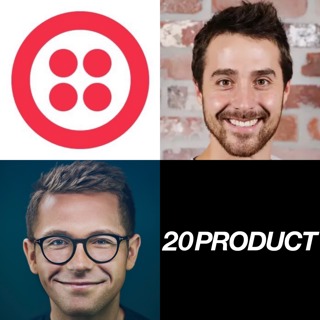
20Product: Why Product Memes Are More Important Than a Product Roadmap, Why Writing is the Essential Skill for Product People, How AI Changes The Role of Product, Big Mistakes Founders Make When Hiring Product Teams with Kevin Niparko, VP Product @ Twilio
Kevin Niparko is the VP of Product @ Twilio. Kevin joined Twilio through the acquisition of Segment where he spent an incredible 8 years in numerous different roles including as Head of Product. Before entering the world of product, Kevin was a Management Associate at the world-renowned, Bridgewater Associates. In Today's Episode with Kevin Niparko We Discuss: 1. From Bridgewater to Head of Product: How Kevin made his way from the world of asset management and analytics to leading product teams? What are 1-2 of Kevin's biggest takeaways from his time at Bridgewater with Ray Dalio? How did the 8 year journey with Segment leading to their $3BN acquisition impact his approach to product? 2. What Makes a Great Product Person: Does Kevin believe that product is more art or science? If he were to put a number on it? What would it be out of 100? Why does Kevin believe that all product people should learn to write? Why does Kevin believe that the best product people are generalists and not specialists? Why does Kevin think that analytics is an insanely good start for product people? 3. How to Hire the Best Product People: How does Kevin approach the hiring process for product hires today? What are the non-obvious traits of hires he looks for? How does he test for them? Does Kevin use case studies? Where do many fall down? What do the best do? 4. Product Reviews: Good vs Great: How often does Kevin do product reviews? Who is invited? How have product reviews changed in a world where the company is now fully remote? What is the difference between good and great product reviews? What is the single best product decision Kevin has made? What did he learn? What is the worst product decision Kevin made? How did that change his approach?
29 Syys 202346min
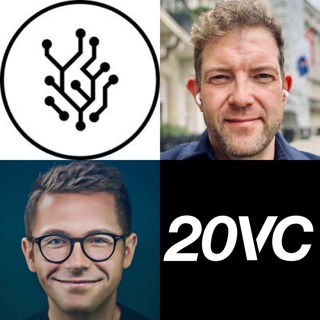
20VC: "How Being a Founder Almost Killed Me"; We Have Lied to a Generation of Founders | The Hardest Truths About Being a Founder Revealed | Why AI Co-Pilot is BS, Seat Pricing is Over & User Interfaces are Stupid with Christian Lanng
Christian Lanng is the Founder and Former CEO @ Tradeshift, a company he took from garage to unicorn raising over $900M for with a latest price of $2.7BN in 2021. Just last month, Christian stepped away from the company and is now Chairman @ Beyond Work, building a better work experience through AI native software. In Today's Episode with Christian Lanng We Discuss: 1. Burnout: When it Hits: How did Christian know when something was really seriously wrong? What were the signs? How did being a founder literally almost kill Christian? How was that not a wakeup moment? How does being a founder make you so out of touch with reality? 2. The Things We Are Never Told: Why does Christian think one of the biggest crimes is the myth that everyone can be a founder? What are the single biggest things about VCs that founders are not told? Why does Christian believe fundraising is absolutely a game? What are the rules to win it? What makes the best VCs? What makes the worst VCs? Why does Christian not like to take a discount for a brand name VC? 3. The Chaos That Happens Inside a Company: Why does Christian believe politics should not be discussed within companies? What are Christian's biggest lessons on working with friends? Why after 14 years does Christian only have 3 friends that still talk to him? How did Christian fire 50% of his leadership team and productivity not change at all? Why does Christian believe US startups are inherently better than European ones? 4. Parenting and Relationship to Money: Does Christian regret not being a present father for his child when building Tradeshift? What are the two options as a founder you have when bringing up kids? Was Christian scared to leave Tradeshift? How does he reflect on his relationship to money? 5. AI: Co-Pilot is BS, The Future Business Model and more... Why does Christian believe co-pilot is the last dying breathe attempt from incumbents? Why does Christian believe that per-seat pricing will die? What will replace it? Why does Christian believe that AI will negate the importance of consumer-facing brands? In what way does Christian believe that UI is total BS? How does it change over time?
27 Syys 20231h 9min






















